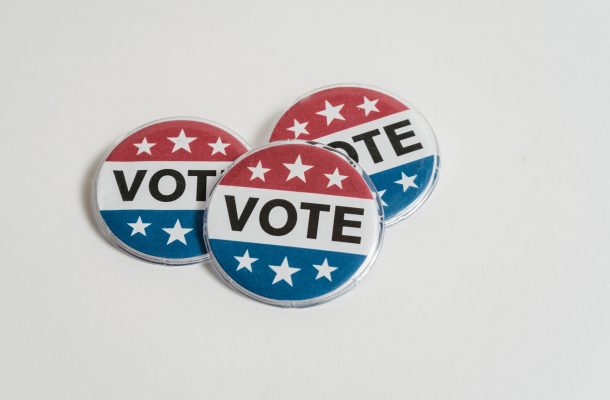Arvanitakis on American politics: A week in politics the Democrats must learn from

This week was not a good week for the Democrats. Less than a year after taking the Whitehouse, they lost the governor’s race in Virginia, a state Joe Biden won by 10 percentage points. In New Jersey, Governor Phil Murphy, a Democrat, had a close win in an election that should never have been close.
Following four years of Trump chaos, many saw the Democrats under President Biden as restoring a balance and calm that would reinstate moderate politics.
Biden started well enough with a direct response to the pandemic, a focus on a bipartisan infrastructure bill and the swift appointment of several respected leaders in key positions including Janet Yellen (Secretary of the Treasury) and Merrick Garland (Attorney General).
But these recent elections have confirmed that this positive start has been followed by a collapse of both Biden’s popularity and support for the Democrats. Just how bad is the slide in popularity? Nate Cohn put it this way:
As Democrats try and make sense of the (election) wreckage… one fact stands out as one of the easiest explanations… Joe Biden has lower approval ratings at this stage of his presidency than nearly any president in the era of modern polling.
But why are voters so unhappy with the Democrats? There is no doubt that the Administration is negatively impacted by the pandemic which has gone on for longer than many people expected.
But this alone fails to account for the levels of discontent directed towards the Democratic party. Here are three key issue that are currently shaping the American political landscape.
Conservative leaning on social issues
Republican candidates have successfully focused voters on a set of social issues without being too aligned to Trump. While the Trump camp sees themselves as the most likely candidate for 2024, many Republicans are aware that he was thrown out of the Whitehouse in a single term and was an important rallying point for moderates and progressives alike. As such, they have positioned themselves accordingly.
The Republicans have campaigned on many high-profile progressive positions that make the headlines that are often out of step with broader public opinion. This was highlighted in Minneapolis, the site of George Floyd’s murder. Here, voters rejected a ballot measure that was part of the ‘defund the police’ campaign that would have replaced the city’s police department with a Department of Public Safety.
In New York, Eric Adams was overwhelmingly voted in as New York City’s next mayor, becoming just the second Black American to represent one of the country’s most diverse cities. As a former NYPD captain, Adams built his mayoral campaign as the law-and-order candidate.
Democratic infighting
Much of President Biden’s agenda has rested on two big bills: one a bipartisan infrastructure bill, the other a Democratic bill that would help middle-class families and reduce pollution. These bills include a range of policies on which voters tend to support including expanding Medicare, Medicaid, and federal programs that help create well-paying jobs.
The problem is that moderate Democrats have so far refused to pass the second bill while progressive Democrats have refused to pass the infrastructure bill without more confidence that the bill focused on health care, education and the climate would pass.
The infighting has contributed to voter frustration that Biden and the Democrats are more interested in talking amongst themselves than helping American families.
The problem now is that the defeat in Virginia could make it even harder for members of Congress to come together on the two bills. The reality they must confront, however, is there is no alternative. Failing to pass any major legislation would contribute to a perception that Democrats cannot be trusted to run Washington.
Disconnection with working class voters continue
The Trump election highlighted the Democrat’s loss of support amongst working-class voters. Defined as people without a four-year college degree, these voters make up much of the electorate. For much of the 20th century, Democrats were the party of the working class, but in recent decades, this has changed.
Working class voters tend to be more religious, more outwardly patriotic, more culturally conservative, more connected to industries that are vulnerable to global competition and, are feeling threatened by the loss of jobs in industries targeted by emission reduction strategies.
While Biden made ground on working class voters in last year’s election, this week in Virginia, exist polls indicate that among voters without a bachelor’s degree, there was a massive defection away from the Democrats.
While there is no doubt Republicans have used the issue of race and white identity to their advantage, it is a mistake to believe that the working-class shift is all about racism alone.
We should remember that the contemporary Democrat who fared best with the white working class voters was President Obama. Further, Democrats are no longer doing as well as they once did in Asian, Black and Latino communities. In fact, Trump fared better with voters of colour in 2020 than in 2016. In Virginia, some of McAuliffe’s most disappointing totals came in heavily Hispanic precincts.
Where to for the Democrats?
While we should note that the Virginia governor’s race often goes against a sitting president, the results confirm that Republicans are clear favourites to retake both the House and the Senate in next year’s midterm elections.
If this occurs, it is unlikely that Democrats would be able to pass any significant legislation in 2023 and 2024.
They can respond in two ways. The first is for congressional Democrats to distance themselves from Biden and drop his legislative agenda. The second is for the party to decide that its best chance at political recovery involves passing that agenda.
It is hard to see how Democrats would benefit from the first option. But it’s not clear whether they remain unified enough to pull off the second. Whether the party collapses into more infighting or manages to unify itself is the next big political question.
Professor James Arvanitakis is the Executive Director of the Australian American Fulbright Commission – one of the world’s most prestigious international education and cultural exchange programs.












